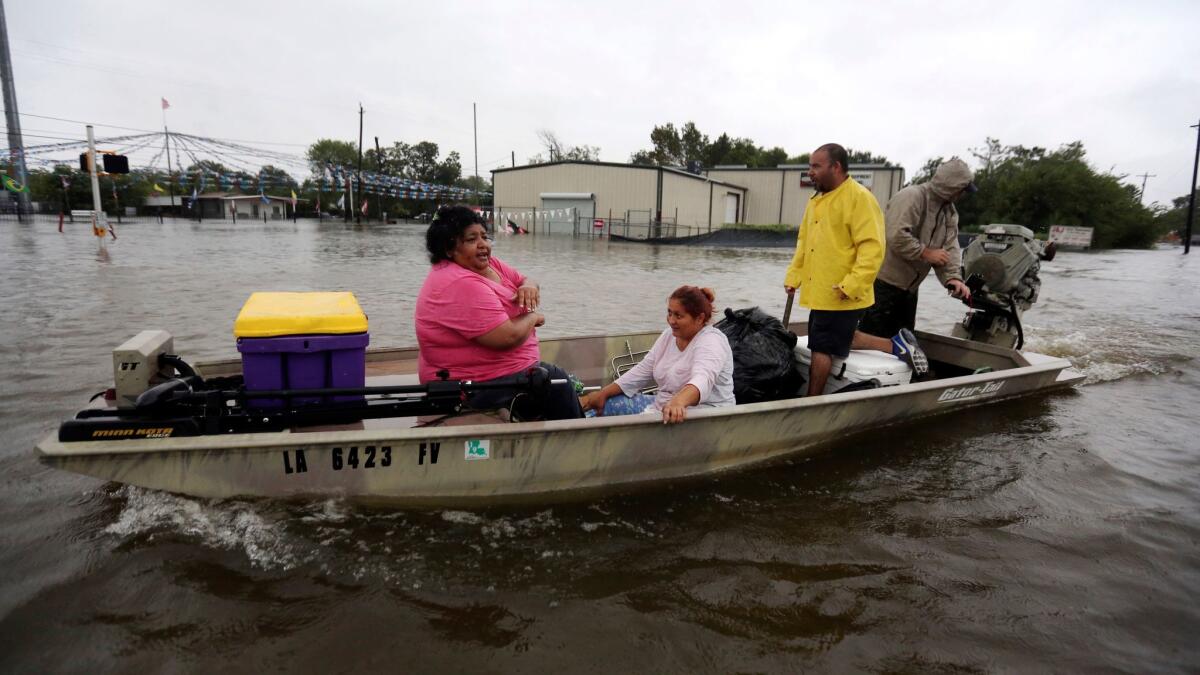Column: Harvey shows that Americans can still rise above politics

- Share via
Even hurricanes have a silver lining: The downpour washes away a lot of bull.
Don’t get me wrong. This is a tragedy for untold thousands of people. And no upside could possibly balance the scale against the downsides. The full human toll of Harvey, now a tropical storm, remains to be determined, but it’s already steep. As of this writing, the official count of fatalities held at eight, but that number will probably rise. The economic cost will take a long time to calculate. And the emotional price – lost homes, heirlooms, pictures, worry, stress – can never be calculated.
And yet, I couldn’t help but notice that there is a “feel good” aspect to the whole catastrophe. The best example is the hyper-viral story of two men loading up their boat and driving into the storm. CNN’s Ed Lavandera found them under a highway overpass readying the vessel.
“You guys just jumping in to help out?” Lavandera asked.
“Yes, sir,” says one of the men.
“What are you going to do?” Lavandera asks him.
“Go try to save some lives.”
That man was African American. His partner appeared to be Caucasian or maybe Latino. But it doesn’t matter at all. We don’t know if they’re Republican or Democrat, pro-Trump or anti-Trump, NRA members or fans of gun control (though let’s be honest: This is Texas so we can guess on that one). All they wanted to do was help. While it was a journalistic faux pas not to get the men’s names, it almost made the story more endearing because it reinforced the idea that they were just normal Americans.
Floodwaters washed away the nonsense and revealed the decency of the American people.
All weekend, TV and social media highlighted stories like this. Granted, there were plenty of attempts to politicize the storm. Some had superficial legitimacy. Did Texas officials – particularly the Democratic mayor of Houston and the Republican governor of Texas – drop the ball in not ordering a mandatory evacuation? But even these debates lacked the bitter vitriol that marked coverage of Hurricane Katrina or even Hurricane and Superstorm Sandy.
Other attempts to bend an apolitical event to a preferred political narrative were more desperate and despicable. The Twitter account for an outfit called Charitable Humans unleashed a Cat-5 gale of schadenfreude at Houston’s woes. Over a satellite image of Harvey: “Texas has been bitten by Karma, but they still have a huge debt to the bank of Karma.” “I just can’t bring myself to even consider providing aid to any red state, let them clean up their own mess.”
To its credit, the organization later deleted its account and released an apologetic statement saying its leaders were “horrified” by their social media coordinator’s actions.
But the point was already made. We live in an ugly, tribal moment in American history. Indeed, the more representative story of the weekend came out of Berkeley, where “antifa” goons beat up nonviolent protesters and even a mere onlooker the mob mistook for a “fascist.”
By comparison, despite the terrible plight of Harvey’s victims, Harvey was the happy story, at least in one narrow respect. Politics is becoming a substitute for identity, even religion, for millions of Americans. How you vote, what team you root for on the cable shout shows, is becoming a signifier of who you are. The media fuel this attitude, in large ways and small, by turning the news into “narratives” of good people and bad people. This is an unhealthy development, regardless of which ideological uniform you wear.
But politics and ideology are, or should be, downstream from all of the most important things in life, at least in America (it’s a different matter in places like Venezuela or North Korea). Under normal circumstances this can be hard to see, never mind appreciate, because we are lucky to live in a fabulously rich and free society where people can afford to make politics into a sport or fashion statement.
Most of us can see this within our own networks of friends and family, where political differences rarely trump more meaningful bonds. But on a mass scale, it becomes apparent only in dire circumstances, like when floodwaters wash away the nonsense and reveal the decency of the American people.
Follow the Opinion section on Twitter @latimesopinion or Facebook
More to Read
A cure for the common opinion
Get thought-provoking perspectives with our weekly newsletter.
You may occasionally receive promotional content from the Los Angeles Times.











